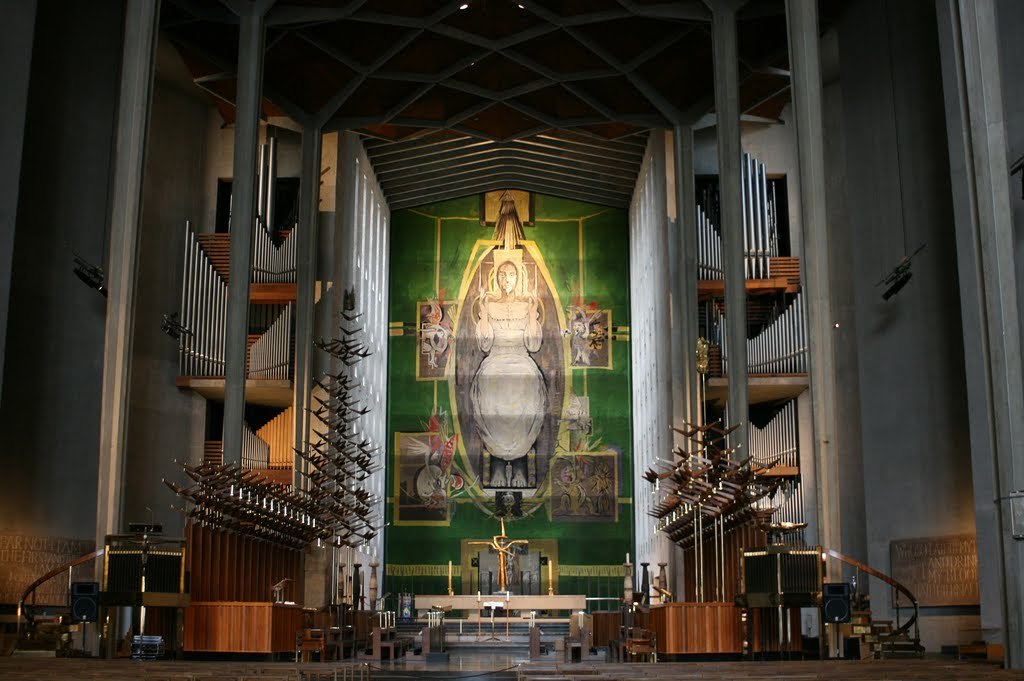[This the second of three reflections offered at the Vocations Day 2012 in the Diocese of London, Willesden Episcopal Area. It was hosted at St Mary's Ealing and offered people the opportunity to come and explore various ministries being undertaken in the church and wider community]
If you’ve seen Graham Southerland’s famous tapestry “Christ in Glory” in Coventry Cathedral, it would have left an impression. One of the largest of its kind, the tapestry is the size of a tennis court. Its imposing size is equal to the impact of its rich palette of tones and textures. Produced in France, it took 12 master weavers over 3 years to complete. During this time hundreds of thousands of threads where woven together through skill and inspiration to create a soaring image of the risen Christ. What’s more, this is not a specter of Christ triumphant, it is the crucified but risen Christ showing you his wounded hands and feet.

On so many levels it represents to us the meaning of vocation in Christian life. It conveys that God’s work in the world is like an inspired weaver, steadily undertaking the creative and delicate task of gathering, looping, threading living strands of great variety to form a powerful image of Christ’s body. Every thread in its own place is critical to the completion of the work.
Unfortunately, the word “vocation” can fail to give us this vision because it is so misunderstood. For some it means “professional Christian” or those who are in sacred ministry – priests, ministers and bishops. For others it’s a catchall description for charity work, something that well-meaning people do outside of their real jobs. If all Christians have a calling, then does it mean you will end up getting ordained or maybe doing charity work? Sadly, many people may avoid exploring their vocation because they perceive it to be a narrowing down of options rather than an opening out of possibility and purpose.
But the basis of the word “vocation” simply means “the call”. And for Christians it finds principle expression in the invitation of Jesus Christ: “Come, follow me.”
Is it possible that vocations can take shape in the real world by so-called “everyday” Christians? Well, the scriptures tell us that as the followers of Jesus we are his collective agency for change in the world. Paul uses the image of the human body to describe the interdependent nature of Christian life. In the body of Christ, each part has an important role to play even though individually they look and function quite differently:
Now if the foot should say, “Because I am not a hand, I do not belong to the body,” it would not for that reason stop being part of the body. And if the ear should say, “Because I am not an eye, I do not belong to the body,” it would not for that reason stop being part of the body… But in fact God has placed the parts in the body, every one of them, just as he wanted them to be. If they were all one part, where would the body be? As it is, there are many parts, but one body. (1 Corinthians 12:15-20)
Here then are two essential qualities of the Christian calling:
1) there are a great variety of vocations
2) every vocation is as important as any other
If all of us form the sacred body of Christ than those who put “Rev” in front of their names are just as valuable to God as those who don’t.
The other very critical dimension of Christian vocation is that it is outwardly directed. Jesus calls us to follow him so that we can in turn “go out into all the world,”(Mark 16:15). This means that our Christian vocation could flourish in a great many contexts because the world is a diverse and vibrant place. It may be the market place, government, or the family. Then there’s the local, regional or national church, the non-profit sector, schools, hospitals, street corners and even hedonistic nightclubs. No place is beyond the touch of Christ and those who follow him. Becoming intentional about your vocation does not mean that you run the risk of getting sucked up into some rarified holy space. Many people are quite surprised when they discover it’s the opposite actually.
So when you respond to God’s call on your life, you take a step to contribute to the rich and multifaceted witness of Christ’s body in the world. This is excellent news because it means that God is calling you to be you. And he is guiding you into a place that is right for you, a context in which your particular work of love will flourish. Rowan Williams puts it this way: “Each of us is called to be a different kind of response to God, to mirror God in unique ways, to show God what he is like, so to speak, from innumerable new and different standpoints.”
Let us pray.
A Prayer of St. Therese of Lisieux:
May today there be peace within.
May you trust God
That you are exactly where you are meant to be.
May you not forget the infinite possibilities that are born of faith.
May you use those gifts that you have received,
And pass on the love that has been given to you.
May you be content knowing
You are a child of God.
Let this presence settle into your bones,
And allow your soul the freedom
To sing, dance, praise and love.
It is there for each and every one of us.
Amen.